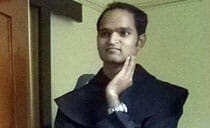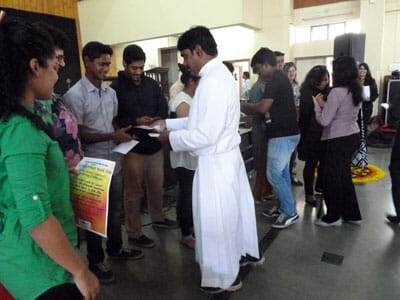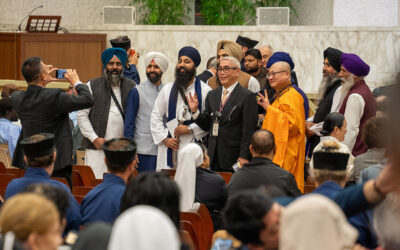 In India, a boom in vocations to consecrated life is seen in various points of the subcontinent: Andra Pradesh, Orissa, and the North Eastern States. “The sense of faith and vision of religious life is well esteemed and the youth feel the urge to enter the novitiate to cultivate their union with the Lord,” Fr Attulli states in an interview with Unità e Carismi (Unity and Charisms) of the Città Nuova editorial group. “They aspire this primarily with experience and prayer – he continued – and they wish to dedicate themselves more to the works of charity. The example of Mother Theresa of Calcutta is strong. From her concrete experience of India, she was able to discover herself and her own vocation, through a profound life of prayer from which her new vocation sprung.” The youth who enter the novitiate come from a part of society that is unable to hide social inequality and poverty, despite the fact that the Indian subcontinent is enumerated among the new world economies. But they have not lost their spiritual dimension, and on the other hand, “Look to God for the solution”. They have found at the same time a solution in social commitment, and in fact “draw inspiration from the works of charity in which they are involved, to solve the poverty in material needs, education, etc. They start with an experience of God, which leads them to undertake apostolic works for the needy.” The Catholic Church has called this the Year of Consecrated life. What should be done to make improvements? “Within the Indian setting, “Fr Attulli explained, “the Church in general and the religious in particular can bear witness to the presence of our Lord Jesus by taking greater care of the poor, in both their spiritual and concrete needs. It is a challenge in this secularized world where we are totally intoxicated with wellbeing! The people want to rediscover God in us, detaching themselves from this addiction to wellbeing.”
In India, a boom in vocations to consecrated life is seen in various points of the subcontinent: Andra Pradesh, Orissa, and the North Eastern States. “The sense of faith and vision of religious life is well esteemed and the youth feel the urge to enter the novitiate to cultivate their union with the Lord,” Fr Attulli states in an interview with Unità e Carismi (Unity and Charisms) of the Città Nuova editorial group. “They aspire this primarily with experience and prayer – he continued – and they wish to dedicate themselves more to the works of charity. The example of Mother Theresa of Calcutta is strong. From her concrete experience of India, she was able to discover herself and her own vocation, through a profound life of prayer from which her new vocation sprung.” The youth who enter the novitiate come from a part of society that is unable to hide social inequality and poverty, despite the fact that the Indian subcontinent is enumerated among the new world economies. But they have not lost their spiritual dimension, and on the other hand, “Look to God for the solution”. They have found at the same time a solution in social commitment, and in fact “draw inspiration from the works of charity in which they are involved, to solve the poverty in material needs, education, etc. They start with an experience of God, which leads them to undertake apostolic works for the needy.” The Catholic Church has called this the Year of Consecrated life. What should be done to make improvements? “Within the Indian setting, “Fr Attulli explained, “the Church in general and the religious in particular can bear witness to the presence of our Lord Jesus by taking greater care of the poor, in both their spiritual and concrete needs. It is a challenge in this secularized world where we are totally intoxicated with wellbeing! The people want to rediscover God in us, detaching themselves from this addiction to wellbeing.”  “Why do people stray from God? Why do they not feel the need to go towards Him? the religious asked himself. And the answer came from his own life experience. “If we stand by the poor and those in need, we discover God’s presence in them. The missionaries who live with the poor, come in contact with people who have faith, even if they need to be helped to grow in the “’culture of faith’, through catechism, prayers and the sacraments.” “In the Indian continent,” he concluded, “not only is there material poverty, but there are also existential peripheries. We are made for love and called to live a serene, peaceful and joyful life in love. Faith does not weigh on our minds, but is there to make us live with joy, not only in the life to come, but here and now. This is why our presence in the existential peripheries and with the poor is of great importance.”
“Why do people stray from God? Why do they not feel the need to go towards Him? the religious asked himself. And the answer came from his own life experience. “If we stand by the poor and those in need, we discover God’s presence in them. The missionaries who live with the poor, come in contact with people who have faith, even if they need to be helped to grow in the “’culture of faith’, through catechism, prayers and the sacraments.” “In the Indian continent,” he concluded, “not only is there material poverty, but there are also existential peripheries. We are made for love and called to live a serene, peaceful and joyful life in love. Faith does not weigh on our minds, but is there to make us live with joy, not only in the life to come, but here and now. This is why our presence in the existential peripheries and with the poor is of great importance.”
See everyone kindly
See everyone kindly




0 Comments